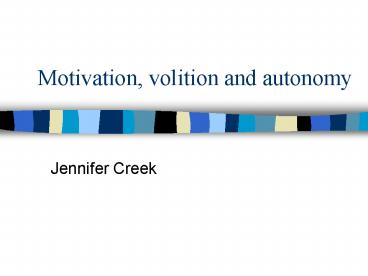Motivation, volition and autonomy - PowerPoint PPT Presentation
1 / 19
Title:
Motivation, volition and autonomy
Description:
When cognitive or volitional capacities are lacking or impaired, autonomous ... by low levels of motivation, volitional disorder and barriers to autonomy ... – PowerPoint PPT presentation
Number of Views:475
Avg rating:3.0/5.0
Title: Motivation, volition and autonomy
1
Motivation, volition and autonomy
- Jennifer Creek
2
The active nature of people
- Man has a vital need for occupation and.. his
central nervous system demands the rich and
varied stimuli that solving lifes problems
provides him and this is the basic need that
occupational therapy ought to be serving. - (Reilly 1962, p5)
3
Contents of paper
- The nature of motivation
- The nature of volition
- The nature of autonomy
- Levels of motivation
- Conditions that affect motivation
- Implications for occupational therapy practice
4
Drive to act
- Extrinsic motivators
- For example
- hunger
- pain
- fear
- Intrinsic motivation
- The drive to act for the pleasure of exercising
ones capacities, learning and taking pleasure in
activity.
5
Creative ability
- Inner motivation or drive towards action
- AND
- The expression of that motivation in action
- (duToit 1974)
6
Levels of motivation
- The motivational level of the individual can be
judged from the quality and level of her actions. - (du Toit 1974)
7
Volition
- The action of consciously willing or resolving
something the making of a definite choice or
decision regarding a course of action. - (New Shorter Oxford English Dictionary 1993)
8
Factors affecting activity choices
- personal interests
- goals and values
- awareness of own capacities
- (Ginsberg et al 1951)
- meanings given to activities
- choices available
- knowledge of what is available
- knowledge of how to access activities
- capacity to see opportunities
- information
- (Creek 1998)
9
(No Transcript)
10
Motivation and volition
- Motivation is a basic drive to be active
- Volition is the skill of being able to make
autonomous choices and decisions about what
actions to take
11
Autonomy
- The capacity to think, decide, and act on the
basis of such thought and decision freely and
independently and without let or hindrance. - (Gillon 1985, 1986, p60)
12
Types of autonomy
- Autonomy of thought
- Autonomy of will
- Autonomy of action
- (Gillon 1985, 1986)
13
Autonomous action
- The action of agents who can understand and
choose what they do. - When cognitive or volitional capacities are
lacking or impaired, autonomous action is reduced
or impossible. - (ONeill 1984, p173)
14
Each person has...
- a basic drive to be active (motivation)
- an ability to make choices about how to act
(volition) - a capacity to think, decide and act freely and
independently (autonomy)
15
Conditions necessary for the exercise of volition
- personal circumstances
- environmental opportunities
- social pressures
16
Someone does not want to do something
- This is an autonomous decision that should be
respected - The level of motivation is low
- There is a problem with volition
17
Circumstances blocking action
- Physical barriers
- Economic barriers
- Social barriers
18
Summary
- Motivation, volition and autonomy explain how
people choose the activities they do - Chosen activities can be blocked by low levels of
motivation, volitional disorder and barriers to
autonomy
19
Conclusion
- Occupational therapists have
- a duty to identify why a client is not engaging
in activity - a requirement to help the client to develop the
skill of making choices - a need to create conditions in which choice can
be exercised.































